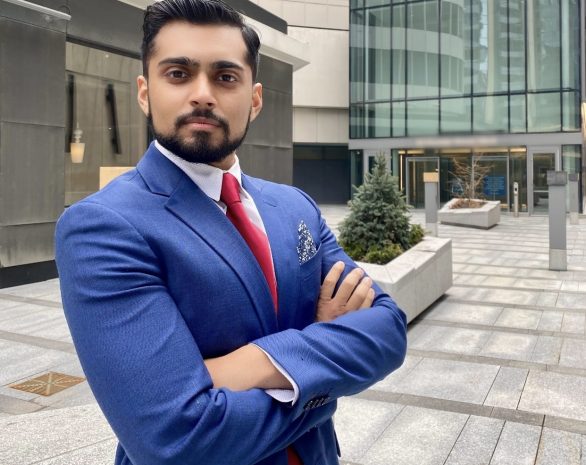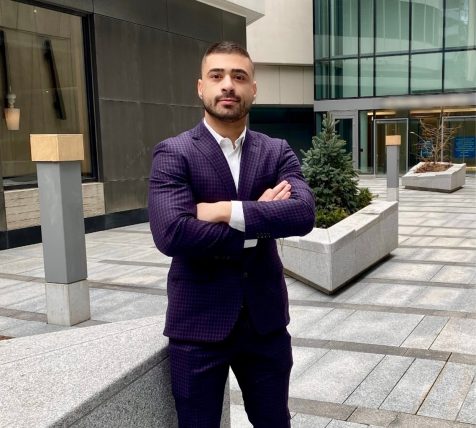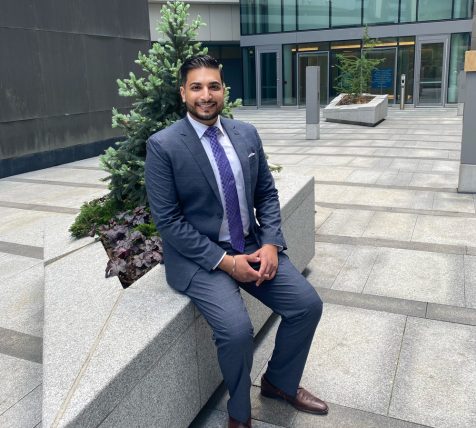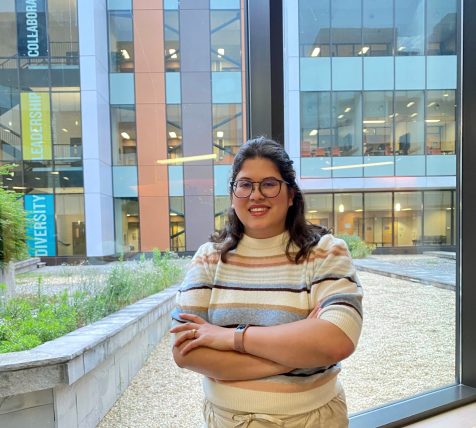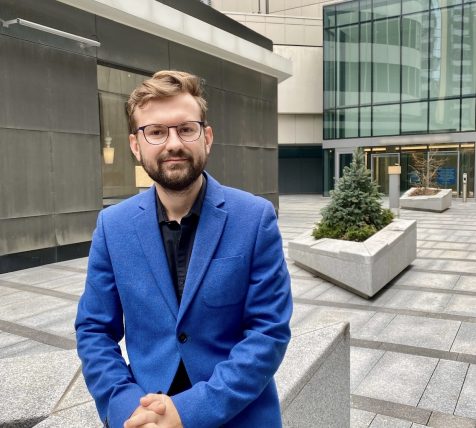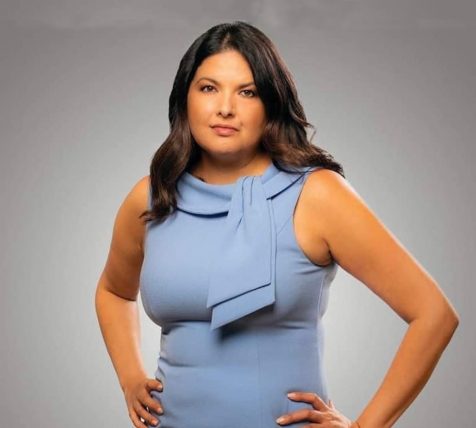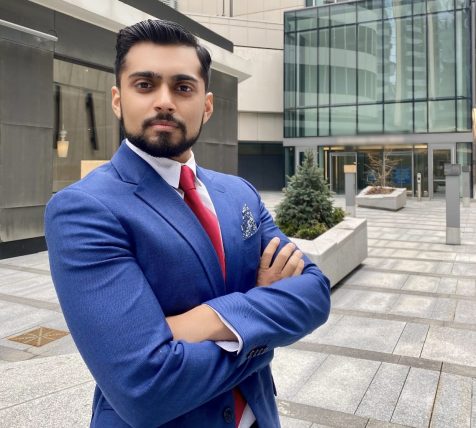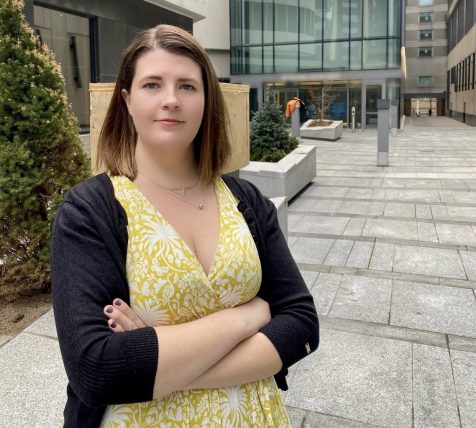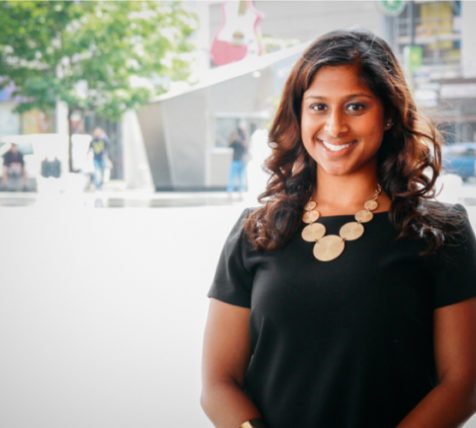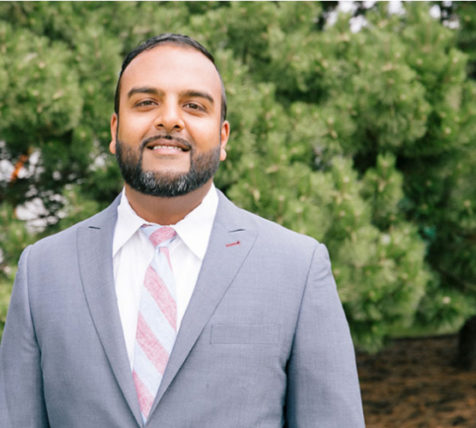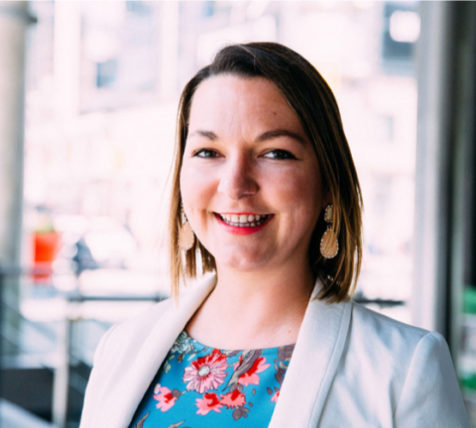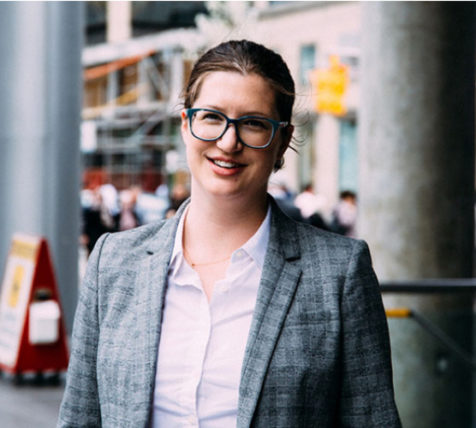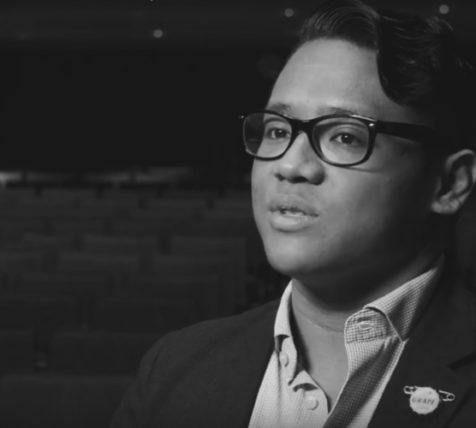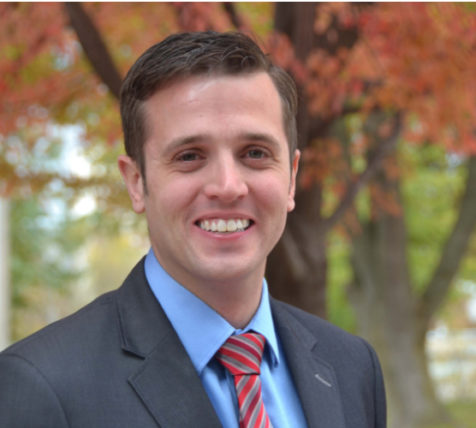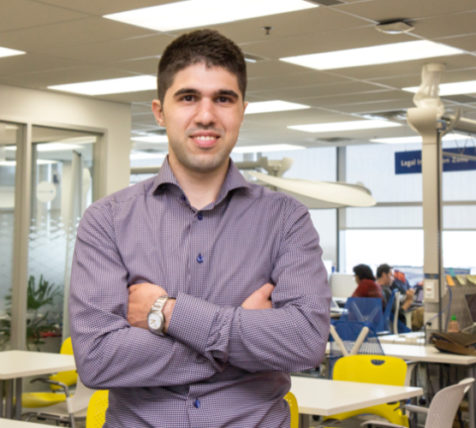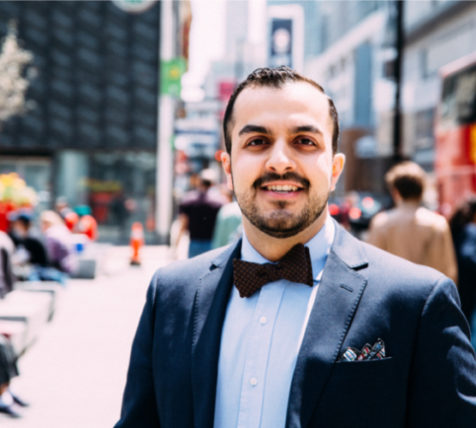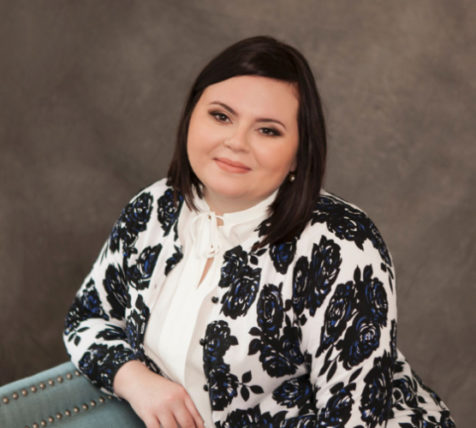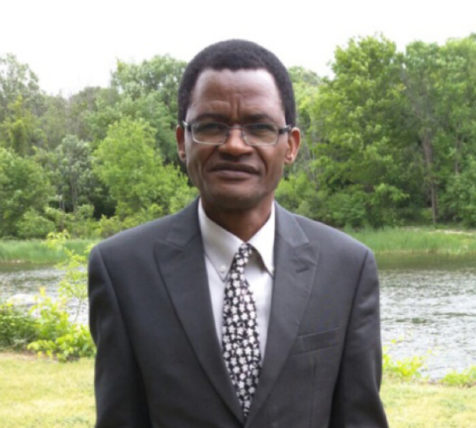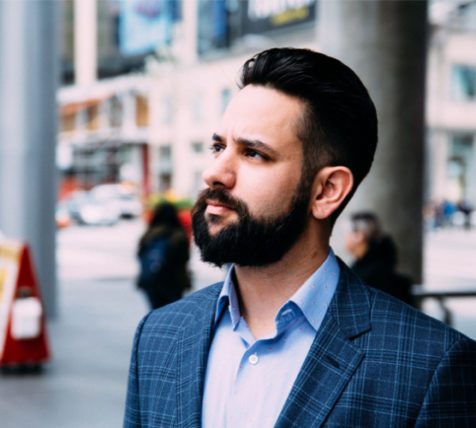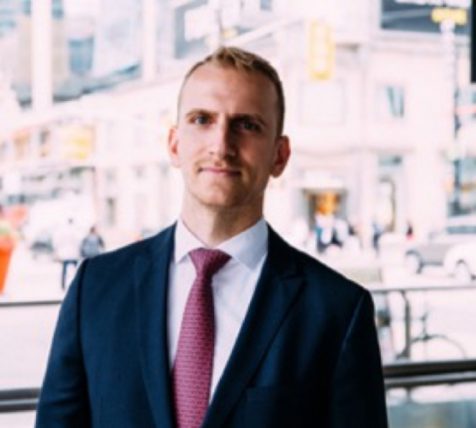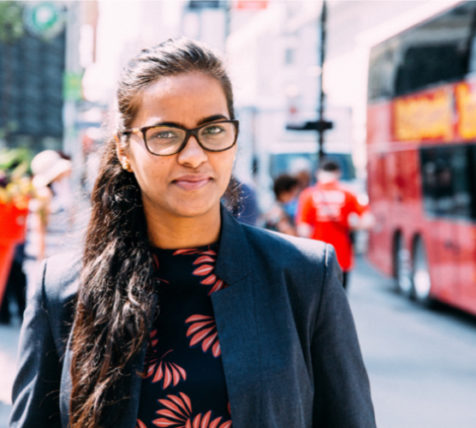Ashley Moniz
2019-2020
Ashley Moniz wields his talent uniquely and bravely. His individuality is his way to express his inner strength. Ashley is creative, honest, and his sense of purpose and humanity shine through in everything he touches.
About Ashley Moniz
Assistant Director, Intellectual Property Law and Technology Program & IP Innovation Clinic York University - Osgoode Hall Law School, Toronto, ON, Canada
Ashley is the first lawyer in his family and the Assistant Director of IP Osgoode, Osgoode Hall Law School’s Intellectual Property Law and Technology Program.
“Through our many initiatives, including our blog (the IPilogue), our IP Innovation Clinic, our panels and speaker series, and our many student internship opportunities, we seek to offer law students practical exposure to intellectual property law practice and issues across varying legal practices,” says Moniz.
Ashley transforms into every role he takes on. In fact, some of his happiest moments have been spent on stage. Around the 7th grade, his parents put him in acting classes. In high school he developed a strong interest in theater, public speaking and musicals – all were instrumental to his self-expression and confidence. During law school he was part of the Legally Blonde and Mamma Mia musicals. “Drama and music have allowed me to build great relationships and tell stories. I think I get my music gene from my dad. He is into music and he’ll often bring out his guitar at a party,” says Moniz.
It’s clear he wants to make a meaningful difference in people’s lives. When he sits at a table - he wants to make sure everyone has access to it. “I want to see the legal industry diversify. Accessibility is key. When it comes to the hiring process - every single person should be able to access every single role at every single level at every company,” he says. Remaining true to his distinct voice – Ashley is at the forefront of a generation of lawyers who are changing the legal landscape and it’s refreshing to watch his innovative and inclusive leadership unfold.
Ashley is the first lawyer in his family and the Assistant Director of IP Osgoode, Osgoode Hall Law School’s Intellectual Property Law and Technology Program.
“Through our many initiatives, including our blog (the IPilogue), our IP Innovation Clinic, our panels and speaker series, and our many student internship opportunities, we seek to offer law students practical exposure to intellectual property law practice and issues across varying legal practices,” says Moniz.
Ashley transforms into every role he takes on. In fact, some of his happiest moments have been spent on stage. Around the 7th grade, his parents put him in acting classes. In high school he developed a strong interest in theater, public speaking and musicals – all were instrumental to his self-expression and confidence. During law school he was part of the Legally Blonde and Mamma Mia musicals. “Drama and music have allowed me to build great relationships and tell stories. I think I get my music gene from my dad. He is into music and he’ll often bring out his guitar at a party,” says Moniz.
It’s clear he wants to make a meaningful difference in people’s lives. When he sits at a table - he wants to make sure everyone has access to it. “I want to see the legal industry diversify. Accessibility is key. When it comes to the hiring process - every single person should be able to access every single role at every single level at every company,” he says. Remaining true to his distinct voice – Ashley is at the forefront of a generation of lawyers who are changing the legal landscape and it’s refreshing to watch his innovative and inclusive leadership unfold.
Law Degree
University of Ottawa, English Common Law Program
LPP In One Word
Empowering!
Favourite Book Of All Time
Harry Potter series by J. K. Rowling
Why law? What inspired your legal aspirations?
In my grade 10 Careers class, I had to complete an aptitude test where we answered dozens of questions and were given a top 10 careers we matched with. My number one was “Mediator” and, when I looked up what that was, I learned that most mediators are lawyers first. The more I read into being a lawyer and its associated skills, the more I felt like using my strong oral and writing skills to advocate on behalf of people who needed it was a good career path for me. It also seemed like a practical avenue for my love of theatre without the uncertainty of becoming a professional actor. I know it all sounds cheesy, I suppose I just received the right direction at the right time. And from January 2010 until my call to the bar in June 2020, every career-oriented decision I made was with the goal of becoming a lawyer.
What is a typical day at work/office like for you?
Because of our many initiatives, my days are always quite different from the last. In a given week, I can anticipate editing and posting articles on our blog and sharing them on social media, assembling and distributing our weekly newsletter (the IPIGRAM), and liaising with IP lawyers, academics, and other creative minds to coordinate initiatives for students or promote academic work. Depending on the time of year, I can also anticipate meetings with students, advertising or facilitating IP Osgoode’s events and contests, or drafting correspondence and reports. And on any given day, I can expect to finish nothing I planned to do because something more urgent came up.
What legal case(s) had a strong impact on you and why?
Whiten v Pilot: the cases I studied in my 1L Contracts course stand out the most in my mind, and this one is probably the most strongly of all. I still remember reading about how awfully the defendant's insurance company treated the plaintiffs in this case and how the courts took their entire experience into effect when awarding what was, at least at the time, the largest punitive damages award ever given. This case showed that, when applied with the right intentions, the law could meaningfully deter future bad actors and compensate victims, rather than let bigger corporations get away with a slap on the wrist for what they put people through.
Describe a defining moment in your legal career
The decision to do the LPP. In May 2019, I was in a rough and frightening position. I finished law school, preparing for the licensing exams, and I still had not secured an articling position. I knew about the upcoming deadline for the Law Practice Program and I had to make a decision: I could continue searching for a traditional articling position or I could take this new path in the hopes that I would have more luck there. I truly believe that if I had not registered for the LPP, I would still be searching for an articling position today, almost three years later, and who knows what I would be doing with my life! Even though I’ve often taken a “path less travelled” of sorts, this moment defined my career because it seemed like the hardest decision to make at the time. In the long run, the LPP helped me to make incredible personal and professional connections and exposed me to work I never expected to do.
Where did you complete your LPP work placement?
Clancy PC, a trademark boutique law firm in Ottawa. My principal, Paula Clancy, was a sole practitioner with a small office in Nepean. Despite having extremely limited exposure to intellectual property law before the placement, I learned the ins and outs of the trademark registration process, both in terms of communications with clients and with the Trademark Office. I also broadened my legal research and drafting expertise and learned more about running and marketing a successful business
Describe a particularly memorable or significant experience during your time at the LPP:
Training: I represented a client who sought refugee status due to persecution on the basis of homosexuality in his home country of Ukraine. The client interview was sobering, but the gravity of the file really hit me while I prepared a research package about the treatment of LGBTQ+ persons in Ukraine and relevant case law. In most of the cases I read, the Refugee Appeal Board sought, to me, very personal and invasive information so that THEY could determine whether, for example, an applicant was really gay, let alone in danger. I struggled with the file while thinking about queer and trans folks around the world who face the same barriers every day, and what a denial of refugee status means for them. Although I received very positive feedback throughout my work on the file, that feeling has always stuck with me.
Summer After LPP: As we settled into the first summer of the COVID-19 era, I knew that many of my LPP cohort would struggle to land associate lawyer positions amidst the pandemic, as I also did. Further to this, I knew that the new cohort would likely struggle to secure work placements under the same circumstances. As an Executive Member of the Law Practice Program Candidates’ Association, I wanted to leverage my platform and resources to give my colleagues a leg up in the market. My fellow executives and I assembled a roster of around 30 volunteers from our cohort to perform resume/cover letter review and mock interviews for outgoing and incoming LPP candidates. Although the LPPCA had run Fall career clinics for years, this was its first Summer Career Clinic. We helped almost 100 candidates that summer. As an added bonus, one of the incoming candidates saw the work I did in coordinating this and referred me to my Director at IP Osgoode, which is how I landed where I am now.
Summer After LPP: As we settled into the first summer of the COVID-19 era, I knew that many of my LPP cohort would struggle to land associate lawyer positions amidst the pandemic, as I also did. Further to this, I knew that the new cohort would likely struggle to secure work placements under the same circumstances. As an Executive Member of the Law Practice Program Candidates’ Association, I wanted to leverage my platform and resources to give my colleagues a leg up in the market. My fellow executives and I assembled a roster of around 30 volunteers from our cohort to perform resume/cover letter review and mock interviews for outgoing and incoming LPP candidates. Although the LPPCA had run Fall career clinics for years, this was its first Summer Career Clinic. We helped almost 100 candidates that summer. As an added bonus, one of the incoming candidates saw the work I did in coordinating this and referred me to my Director at IP Osgoode, which is how I landed where I am now.
Describe some of the more particularly helpful tools or skills you acquired during the LPP
Although I have generally been a strong writer, the LPP helped me learn to produce quality content quickly. I often get tunnel vision trying to make every detail perfect, but when you’re on tight, clearly defined deadlines, you cannot account for that level of precision. The LPP helped me sharpen my research skills, again while under time pressure.
The LPP was also the first time I learned to collaborate with a team while working almost completely remotely from one another. None of us could have known at the time how relevant this skill would become.
The LPP was also the first time I learned to collaborate with a team while working almost completely remotely from one another. None of us could have known at the time how relevant this skill would become.
Anything else you'd like to share about the LPP and your experience
Although some elements of law school and the licensing process are stuck in the past, the LPP better reflects the demands and experiences of the modern legal workforce than any other part of the licensing process, at least that I’ve seen. I truly believe that every licensing candidate should complete the LPP training and learn how to run a law practice - law graduates should be assessed by this metric instead of by whether someone else wanted to hire them and how long they were employed.
